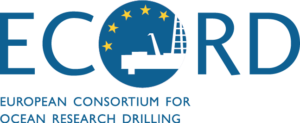Coastal hydrological systems provide significant freshwater to coastal communities around the world, and the offshore component of these systems is poorly understood. While volumetrically significant, onshore-offshore freshened water is also susceptible to contamination due to rising sea level. To date, we know very little about the dynamics these shoreline-crossing groundwater systems and the age of the water in these systems, and even less about their influence on cycling of nutrients and rare earth elements.
The northeast coast of the United States is perhaps the best understood example of an offshore freshwater system, and multiple studies have been undertaken to determine the origin and volume of offshore freshwater. Coring and sampling the subseafloor offshore Massachusetts, USA, will provide data for understanding the processes driving emplacement of freshwater lenses offshore New England and elsewhere globally, and lead to a better understanding of this worldwide hydrogeological phenomenon. This is essential for protection and sustainable management of offshore freshwater systems and for better understanding biogeochemical and elemental cycling in continental shelf environments.
Dedicated drilling, coring, and laboratory analyses focused on the New England shelf onshore-offshore hydrogeological system are required to fully understand emplacement processes and dynamics. We plan a three site transect to depths less than 550 m below seafloor along the US Atlantic continental shelf south of Massachusetts, USA to address the following key scientific questions:
- What is the distribution of freshwater, fluid pressures, and temperatures across the New England Atlantic continental shelf?
- How old is the groundwater and when was it emplaced?
- Was freshwater recharged by basal melting of ice sheets, infiltration from proglacial lakes, and/or direct recharge from precipitation?
- Do fluid pressures reflect equilibrium conditions or are overpressuring mechanisms involved?
- What are the current concentrations, production/consumption rates, and cycling of methane, nutrients, and rare Earth elements in shelf sediments?
- What are the rates of decomposition of sedimentary organic matter and which redox processes/microbial communities are involved?
- What are the magnitudes of long-term fluxes of methane and nutrients from the shelf due to periodic flushing during the Pleistocene?
- Does the emplacement of ice sheet meltwaters in confined aquifers create a unique environment for methane?
- What is the sea-level history along this glaciated margin?
The offshore project phase will last between 60 and 90 days and will include coring and in situ sampling of sub-seafloor sediments and fluids from a specialized vessel. A team of 29 (TBC) international scientists, led by the Co-chief Scientists (Brandon Dugan and Karen Johannesson), will participate in the expedition Science Party, and operations will be implemented by the European Consortium for Ocean Research Drilling (ECORD) as part of the International Ocean Discovery Program (IODP). Due to the limited facilities likely available offshore, only a minimum number of measurements will be made on the vessel. For this reason, not all members of the Science Party will participate offshore. Post-expedition, the entire team will meet for an onshore phase (the “Onshore Science Party”) held at the IODP Bremen Core Repository and MARUM laboratories in Germany, planned for winter 2024. Here, the core will be split into working and archive halves. The working half will be described, analysed and sampled by the science team. The archive half of the core will be saved at the IODP Bremen Core Repository for future research needs by the global scientific community. The initial results from the expedition will be published in peer-reviewed journals, the IODP Proceedings, and in the ICDP-IODP Program Journal Scientific Drilling. One year from the end of the onshore phase, the cores and all “shipboard data” acquired during the offshore and OSP become available for use by any scientific researcher who wishes to study them.

